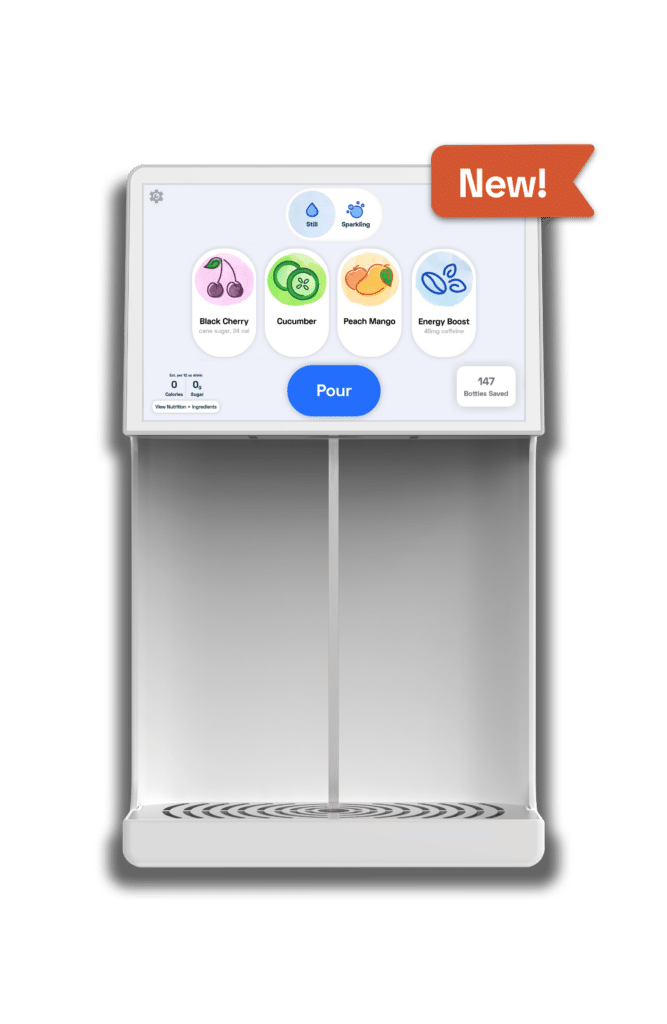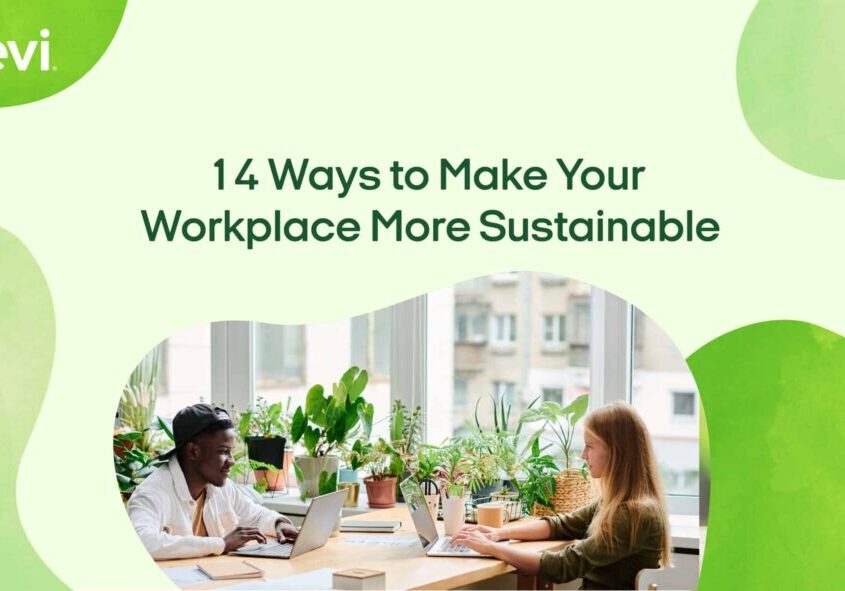With the general population caring more than ever about climate change due to rising temperatures and heavily-polluted air, many businesses are beginning to implement eco-friendly practices into their daily operations, and we predict this will continue in 2023 and beyond.
Going green in the workplace has tremendous benefits. It can cut business costs, increase worker productivity, boost morale, and of course, help save the environment.
Need another good reason to implement more sustainable practices? Take a look at your competition. Next Energy Technologies found that out of the 200 companies they surveyed, 33% reported losing business to their competitors because of insufficient climate practices.
Sustainability efforts can also impact your hiring practices. According to a new report from Handshake, a career resource platform, nearly two-thirds of 1,800 respondents stated that they were more likely to apply to a job that committed to sustainable practices.
So, what can you do to make your workplace more sustainable? We’ve highlighted 14 tips below:
1. Implement a recycling and composting program (and educate employees on best practices)
With plastic production expected to triple by 2050, one of the most important ways you can help the environment today is by ensuring you recycle the right way at work.
Place recycling bins next to your trash bins and clearly label what can and cannot be recycled. For example, most recycling services accept plastic bottles, beverage cans, and flattened cardboard. Check out this comprehensive Recycling 101 guide by WM for more details on how to properly recycle.
Along with recycling, your workplace (and the planet) can benefit significantly from a composting program. Luckily, setting up an effective system for composting at work is a lot quicker and easier than you think. Plus, it’s a great way to get the whole office working together for the common good.
You can read our blog post about composting at work here.
It’s also helpful to send out a refresher email every now and then to keep employees up-to-date on best recycling and composting practices.
2. Switch to a smart water cooler for your beverage needs
Another great step towards a sustainable business? Switching from single-use bottles and cans to a Bevi machine. The bottled beverage industry is arguably the most environmentally wasteful in the world, as billions of plastic bottles are produced yearly in the U.S. alone.
Bevi is committed to designing and supporting the best possible products to replace single-use bottles and cans, with every Bevi machine saving thousands and thousands of bottles and cans annually. Today, Bevi smart water dispensers have saved the waste generated by over 300 million plastic bottles.
With delicious flavors made from natural extracts and no artificial ingredients, your workplace will enjoy a personalized hydration experience while keeping harmful, non-biodegradable plastics out of the oceans and landfills.
3. Buy sustainable office furniture
Just like fast fashion, fast furniture is also taking a toll as cheaper, flimsier couches, tables, and chairs end up in landfills more often than their sturdier counterparts.
If you’re considering replacing your office furniture or perhaps furnishing a new space, search through popular reselling networks like Nextdoor or Facebook Marketplace for gently used office chairs, desks, and light fixtures. If buying new is a must, check out some of our favorite sustainable brands, like The Citizenry and West Elm.
To learn other ways you can furnish your workplace with sustainability in mind, check out this blog post.
4. Buy office snacks in bulk to cut down on packaging
Office snacks are always a hit amongst employees, but the unnecessary waste produced by plastic and cardboard packaging can quickly add up.
Try buying your office snacks in bulk containers to cut down on unnecessary single-use packaging. Go even greener by encouraging employees to portion out their servings using reusable cups or small bowls.
5. Buy eco-friendly and responsibly-sourced coffee
Though it’s a must-have perk for many offices, not all coffee is created equal. Considering that 53% of Americans drink at least one cup of joe a day, switching to an eco-friendly, fair-trade coffee brand can have a significant environmental impact.
If your office uses a single-serve coffee machine that takes disposable pods, shop for fully recyclable capsules from a sustainable brand like Larry’s Coffee.
6. Invest in reusable silverware and dinnerware
If your workplace enjoys the occasional catered lunch or employees bring in their own meals, it’s a great idea to invest in reusable silverware and dinnerware to prevent more plastic from entering landfills.
In addition to the usual forks, knives, and spoons, it’s also helpful to have a set of reusable serving utensils on hand, rather than relying on the disposable utensils provided by the catering company.
7. Invest in a TerraCycle box for snack wrappers
Even with bulk snack options in the office, sometimes it’s just more convenient to stock up on individually wrapped treats. In that case, investing in a TerraCycle Zero Waste Box™ is the way to go. All candy and snack wrappers that are collected through the Zero Waste Box solution get sorted and processed into raw materials that are used to make new products.
Although these boxes are on the pricier side, they’re an extremely worthwhile investment if your workplace goes through single-serving snacks like nobody’s business.
8. Implement a “Bring your own water bottle” policy
Considering that the average American spends $260 a year on single-use bottles, bringing your own bottle, tumbler, or coffee mug to work is one of the easiest and healthiest eco-initiatives to institute in the office. Pair this policy with a smart water cooler, and you’re well on your way to a greener workplace!
This initiative will not only reduce the plastic waste in your office, but will also boost productivity and encourage employees to swap out sugary canned drinks for something more hydrating.
9. Install a bike rack to encourage sustainable commuting
With road vehicles accounting for roughly 74.5% of global transport emissions, encouraging more sustainable commutes should be a top priority.
A bike rack is a relatively easy, one-time investment that can have a huge impact on how your employees commute to work. Biking is a great way to stay healthy, and your office building will play a vital role in protecting the planet at the same time.
Want to encourage sustainable commuting even more? Take this tip one step further by offering commuting stipends for regular bike maintenance, safety equipment, and replacement
10. Donate or recycle old office electronics
Have you recently purchased new laptops, TVs, or keyboards for the office? It’s probably a good time to get rid of the old stuff to make room for the new. Most electronics are made from valuable resources and materials — such as plastic, glass, and metals — that require significant energy to process and manufacture.
Do your part to conserve natural resources and reduce air pollution by recycling those old computer monitors sitting in your company storage unit. If your electronics are still in good condition, consider donating them to a local thrift store or charity instead.
11. Use recycled copy paper
With more people choosing digital over physical copies, there’s a lot less paper being used in the office today. Even still, there will always be a need for physical printouts.
Switching to recycled paper has many environmental benefits–from protecting our vulnerable forests to trimming the overall energy and water consumption used by logging machinery. Plus, nowadays recycled copy paper looks and feels identical to its non-recycled counterparts. Your employees won’t notice a difference, but the planet certain
12. Add biodegradable trash bags to the kitchen
When we think about recycling and composting, we typically think of what gets stuffed inside garbage bags, but what about the bags themselves?
Luckily, there are eco-friendly trash bags made from plant-based materials that break down much quicker than traditional bags—only a few short weeks compared to hundreds of years. Some of our favorite compostable trash bags include these bags from HoldOn and AirCover’s 8-12 gallon biodegradable trash bags.
13. Install water-saving fixtures in the kitchen and bathrooms
If it’s been a while since your office bathroom and kitchen faucets have been replaced, it may be time to invest in some high-quality, water-efficient fixtures to decrease water consumption.
When shopping around, search for WaterSense-labeled faucets and faucet accessories. These faucets help save water by reducing the sink’s average flow rate without sacrificing performance.
Another water-saving tip is to avoid pre-rinsing your dishes before loading them into the office dishwasher. Not only does this waste water, but it’s been proven that pre-rinsing dishes can actually prevent your dishwasher from doing its job properly.
14. Limit thermostat use whenever possible
Instead of keeping the workplace as cold as the company fridge, try setting your air conditioning system at 72 degrees Fahrenheit. If your workplace is still comfortable at this level, try going up another degree or two. Take advantage of the outside breeze by opening up the windows if the weather allows.
The higher your thermostat reads in the summer months, the more energy — and money — you’ll save in the long run.
Let’s all work together to make the workplace more sustainable
Sustainability is a daily practice that compounds over time, so we recommend starting slow and steady. Begin by taking a look around your workplace and finding areas where you can implement a few of the tips we’ve mentioned above. Perhaps it’s switching out those cases of water for a more eco-friendly beverage option, or it’s starting a company-wide composting initiative.
What sustainable workplace practice are you looking to carry out first? Share your thoughts with us on our Facebook, Instagram, Twitter, LinkedIn, and TikTok!






